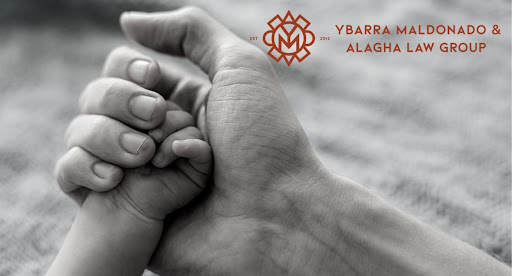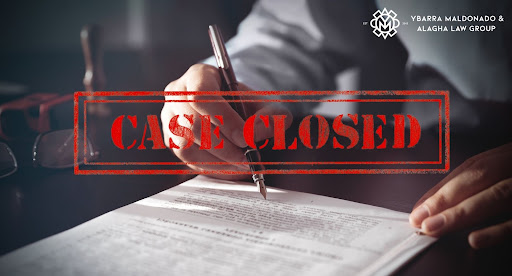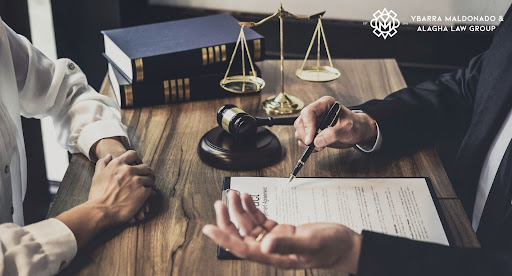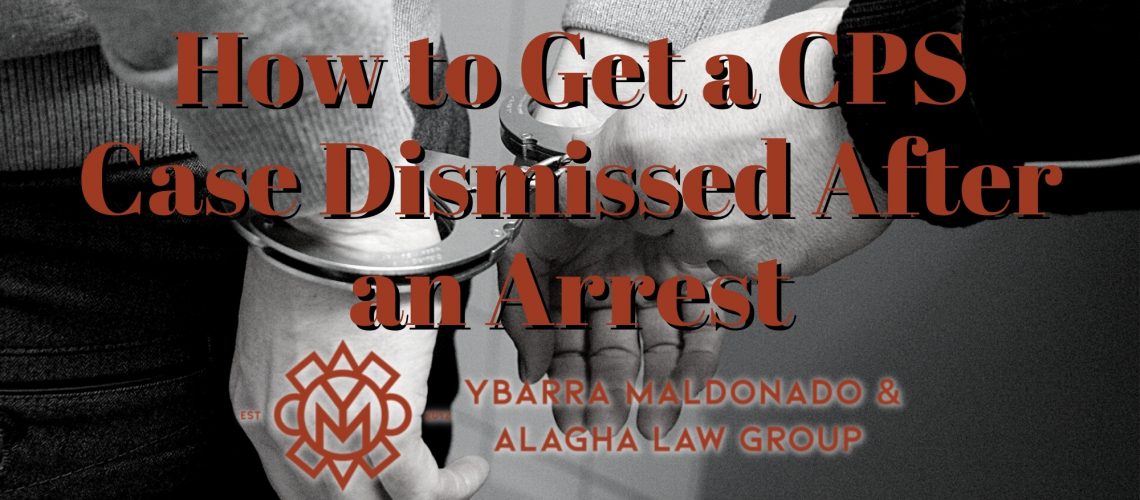When you face arrest in Phoenix, you’re probably stressed about what to do next, especially if you have children. That’s why you need a qualified Phoenix criminal defense lawyer to help. At Ybarra Maldonado Law Group, we have extensive experience helping Arizona citizens fight their criminal cases. We also help them navigate the complexities of life that come along with an arrest. In this blog, we cover how to get a CPS case dismissed following an arrest. To schedule a consultation about your case, please call 602-910-4040 or fill out our online intake form.
What is CPS?

Child Protective Services (CPS) is a branch of your state’s social services department. They are responsible for assessing, investigating, and intervening to secure protection for children who are victims of or are at risk of child abuse or neglect. This includes physical, sexual abuse, or emotional child abuse. CPS must follow both state and federal law. They use a scale of 1-4 to help prioritize investigation and action. Priority 1 reports are the most urgent and must be looked into within two hours. Priority 2 requires 48 hours, Priority 3 requires 72 hours, and Priority 4 requires seven days.
DPS
In Arizona, the Department of Child Safety (DCS) is the CPS state-level equivalent. Their core principles are: Ensuring the safety of all Arizona children. Specifically, they want to ensure that all Arizona children live in safe environments with loving families. DCS’s duties prioritize helping families get the services they need to stay together whenever possible. They intend to help instill and reinforce familial relationships.
It is essential to know why your children have been removed following an arrest in this instance. Sometimes, a child is removed due to a parent with sole custody facing arrest. This is to ensure that they will have secured and safe accommodations until the parent’s case concludes. CPS / DCS will aim to put the child with a close relative throughout the parent’s criminal process, but if none is available or exists, they will remain in state care or the foster care system.
What Happens During a DCS / CPS Investigation?
As per Arizona statute, 60 days is the limit to complete a DCS / CPS investigation once begun. In general, CPS investigations will start within 24-48 hours in cases with immediate danger or within 30-90 days if immediate danger is not present.
The investigator must make “reasonable efforts” to locate the child and family and visit in person. Reasonable is defined as three attempts at different times of the day. Once contact is established, the investigator must give verbal and written information on their parental rights. They must make reasonable efforts to receive written acknowledgment in return.
Before leaving, the CPS / DCS investigator will determine if there is a “present and immediate danger” and need for protective services. If not, services like parenting classes will be offered for a voluntary agreement. If yes, then they must establish a plan (not exceeding 14 days) to ensure a responsible adult supervisor for the safety of the young child and start the “family functioning assessment” evaluation for long-term child safety consideration. The case is closed if no services are needed.
Perceived Imminent Danger
Say the child is removed due to perceived imminent danger. The DCS must issue a temporary custody notice with reasons for removal. Unless the DCS files a dependency action with the Juvenile Court, the child will have to return to the parent in 72 hours. If services are needed, the DCS will use the family-functioning assessment to determine if they should be done voluntarily or under Juvenile Court direction.
The Juvenile Court judge will monitor the process of DCS’s child care and the parent(s) participating in the service(s) offered or are given a court order via periodic “report and reviews.” The judge(s) will ultimately determine if reuniting the family or adoption are is the best course of action based on further investigation, enough evidence, cps records, and the perceived level of child’s safety concerning substantial risk.
Parent Facing Arrest
Suppose a child or more is removed due to a sole-custody parent facing arrest. In that case, the children will be removed from the parent’s control and supervision until a verdict has been reached on the parent’s criminal trial process. This will either result in them being returned if you are not guilty, if you face no jail time, you may be able to retain partial custody if the terms of probation/work release/diversionary requirements are abided by or, if convicted, be followed by a process to regain custody after serving your sentence.
What is the Difference Between a Closed Court Case and a Dismissed Court Case?

Closed Cases
A case is labeled “closed” when it goes to trial, and a conviction has been made. Closed cases do have the chance of being “reopened” to present new evidence and be reevaluated. A closed case would be called after the court is informed that there will be no more calling of evidence on either side (even if none has been provided), and “closing arguments” are had, and the judge/jury retires and makes a decision.
Dismissed Cases
A “dismissed” case can occur at the time before a trial when it is determined that a case cannot proceed; this can be due to a lack of enough evidence that a case would be impossible to succeed. A case can also be dismissed because several deadlines for necessary proceedings have not been met and accomplished before a trial; thus, you cannot continue with a trial. However, a dismissed case cannot be recalled forth without a court-convincing appeal to put aside the dismissal.
To state it simply, all dismissed cases are closed, but not all closed cases are dismissed. A closed case will have no more proceedings, conviction, and with or without dismissal. However, a case can also be closed if no charges are filed; it cannot be dismissed in that scenario.
Sole Custody Arrest Situations
In the circumstances of child protective services or the department of child safety becoming involved and taking your child following an arrest, CPS / DCS is not inherently creating a case that must be filed with the Juvenile court. Often, they become involved after arrests only when the arrested individual has sole custody over the child. During the time until the end of the criminal trial process, and sometimes throughout the remainder of their sentence being served, CPS / DCS will act to ensure the child has proper accommodations and care from a responsible guardian. By the end of their sentence, the child will be placed back with their parent if not put in danger with their return.
In this situation, no CPS or DCS case is being filed; this means that no case will be presented and closed. If CPS or DCS tried to present it as a case, it would likely be dismissed before the “case” would begin since there is no endangerment to the child, just a lack of secured and safe accommodations throughout the trial and penalty of a sole-custody parent:
- As a case with no possibility of succeeding, as it lacks enough evidence, etc., it would be dismissed at the start.
- A case that does have enough evidence to present, actually posing some endangerment to the child, has the chance to be closed at the end, with the chance of being reopened, regardless of conviction status.
- A case that makes it to the can also be closed and dismissed with prejudice; this means that the plaintiff cannot refile the same claim again in that court or not without a court-convincing appeal.
Note that many cases and circumstances can be complicated and nuanced, so it is essential to consult with an experienced attorney.
CPS After a Criminal Case
If you are facing Child Protective Services (CPS) or the Department of Child Safety (DCS) following an arrest for a criminal case, you should also seek an experienced criminal defense attorney in Phoenix for your criminal case. A defense attorney can help you outline your rights and the details of your current situation. Having a good and solid attorney-client relationship will also allow for further investigation if needed and be accused as an alleged perpetrator.
Being forthcoming, respectful, and cooperative with your defense attorney and child protective services can work in your favor to show that there has been no domestic violence, sexual abuse, or neglect to constitute that child abuse claims or suspicions have occurred and that you are facing false allegations and are not an alleged abuser.
How to Get a CPS Case Closed

While you are not legally obligated to cooperate with CPS or DCS, unless they bring a court order, working with the CPS workers, agents, and social worker, will allow for the case to close sooner. Providing documents, permitting entrance for a home inspection, answering questions, etc., will all assist in resolving the issue and getting it closed before it goes to Juvenile Court.
CPS and DCS workers are also still people. They’re just doing their jobs to ensure children are protected and have their best interests in mind. They do not want to see a child separated from their parent(s) unless necessary. Also, the judge must find clear and convincing evidence before terminating parental rights. So they do not necessarily want the separation either.
Suppose the caseworker deems a child immediately faces the danger of emotional, physical, or sexual abuse or neglect. In that case, they will have a petition filed with a city attorney and have the judge take a look and determine if the child should remain or not in the home. So, if you cannot get a case closed before Juvenile Court, you can take the case to trial if you disagree with the judge’s decision.
The judge and court find clear and convincing evidence before terminating parental rights if they determine they need to. The judge will choose to do one of the following at the court hearing:
- Order the parent to cooperate on the case plan with social services
- Orders the alleged abuser to leave the home
- Order the child to be removed and placed with a foster family or another relative
- Appoint a guardian
- Order the parent to pay child support
- Dismiss the petition
How Do I Know If My CPS Case Is Closed?
You will know if your Child Protective Services (CPS) or Department of Child Safety (DCS) case is closed. You will be informed via a letter of notification within 90 days after the investigation. If you haven’t received one or are still concerned, follow up by contacting the CPS caseworker for your case’s status.
Can CPS reopen a closed case?
Remember that it is possible to reopen a previously investigated case. This can occur if new evidence is presented and the case is not dismissed. The agency has the right to continue opening any closed case. This is true if it feels it needs to protect the child’s safety and wellbeing. There isn’t much that can be done to prevent a case from being reopened.
Common reasons for CPS or DCS cases previously investigated and closed to be reopened include:
- If you have been recently diagnosed with a mental health issue, CPS / DCS may watch you for a while after the case is closed and reopen if endangerment of the child’s safety or suspicion is brought to attention.
- Suppose a family cannot prove they can provide a stable environment financially (food, shelter, clothing, etc.) for the children, resulting in negative impacts on the kid’s wellbeing. In that case, CPS / DCS may reopen based on persistent financial concerns.
- If the persons involved have a history of domestic abuse onto or from any family members, CPS or the DCS may monitor the child’s home and wellbeing after a closed case and reopen to prevent them from being victims of child abuse or neglect with protective services.
How to Get a CPS Case Dismissed

The best way to file a motion to dismiss a CPS court case is before it reaches court. This is due to a lack of enough evidence to substantiate allegations. In this situation, CPS / DCS cannot continue the investigation without family consent. Requesting your case to be modified by a judge is an early step in favor of dismissal. Focus on your parental rights. Remember that you can request a case dismissal in court to prevent further harm to your family, as well.
You should seek to have a case dismissed with prejudice because it permanently cannot be opened again later. A case that is simply dismissed without prejudice still has the potential to be reopened.
Also, every stage of a CPS or DCS case is an opportunity for advocacy. One of the following five findings will be issues concerning abuse and neglect that have or have not occurred.
- Reason to Believe (RTB): is when abuse or neglect did indeed occur, leading to an open case.
- Ruled Out: when abuse or neglect did not happen and the case is closed.
- Unable to Determine: not enough evidence is found or provided to prove whether or not abuse or neglect occurred. This has more evidence than finding Ruled Out, resulting in a closed case.
- Unable to Complete: parent cannot be located, so the case is closed.
- Administrative Closure: children are determined as currently safe, even if abuse or neglect has occurred in the past.
Criminal Defense Lawyer for CPS Cases in Phoenix
Do not attend hearings and proceedings without an experienced attorney. They can guide you on the in’s and out’s and your rights. Being in the best position during an inspection, answering questions, and providing evidence clearly and cooperative will help significantly. If you must recover custody, seek an experienced attorney in that as well.
Ybarra Maldonado Law Group will provide you with thorough, comprehensive, and unrelenting legal representation and consultation. This ensures a trusting and reliable attorney-client relationship. Contact us for your criminal case and lawyer needs if you face CPS after an arrest. We will help you navigate the complex legal system with relative ease. To schedule a consultation with an experienced and qualified attorney, please call 602-910-4040 or fill out our online intake form.


